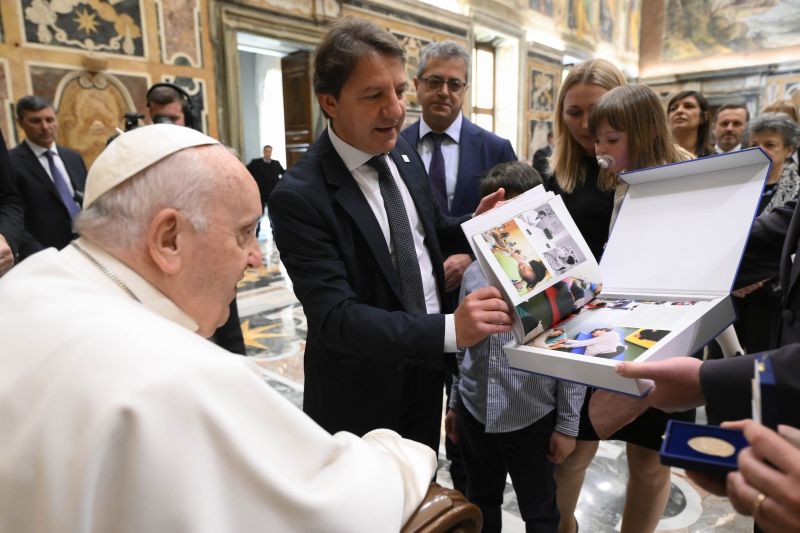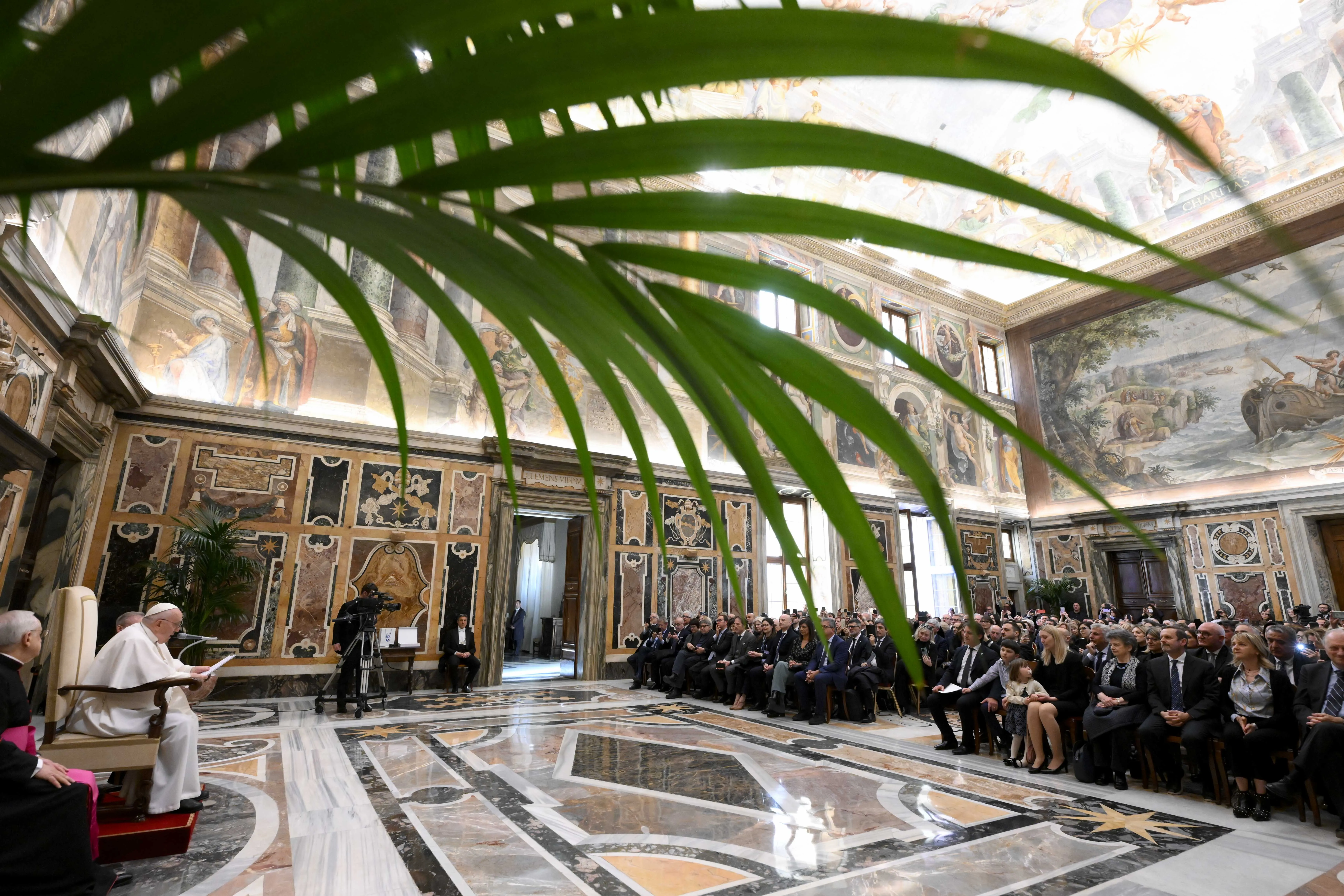
Vatican City, Feb 19, 2020 / 12:01 pm (CNA).- In the United States, Eastern Catholics face many of the same challenges as Latin rite Catholics, but the Eastern Catholic Churches are particularly concerned about growing anti-immigrant rhetoric and the plight of Christians overseas, a Ukrainian Catholic archbishop said Wednesday.
The U.S.-based Eastern Catholic bishops are in Rome for their ad limina visit to the Vatican and to the tombs of St. Peter and St. Paul Feb. 17-21.
“I see [the ad limina visit] as a chance for discussion, but it’s also a chance for communion,” Archbishop Borys Gudziak, Ukrainian Archbishop of Philadelphia, told CNA Feb. 19.
The bishops met with a group from the Secretariat of State, including Cardinal Pietro Parolin and Archbishop Paul Gallagher, Feb. 19 for an hour and 45 minutes. Their meeting with Pope Francis will be Feb. 20.
“When you meet your father and when you meet in the family, it’s important to discuss different questions and the issues that arise, but it’s also important just to be together. That’s what this ad limina visit is like and I think that’s what our encounter with the Holy Father will be like tomorrow,” Gudziak said.
The archbishop is the metropolitan for the Ukrainian Catholic Church in the U.S. The Ukrainian Greek Catholic Church is the largest of the 23 Eastern Catholic Churches.
There are eparchies of 10 Eastern Catholic Churches in the US: Ukrainian, Ruthenian, Melkite, Syriac, Maronite, Armenian, Romanian, Syro-Malankara, Chaldean, and Syro-Malabar. Many of these serve large immigrant populations.
Gudziak said some of the concerns shared by all Catholic bishops in the U.S., and which were discussed in Wednesday’s meeting with Parolin, are “for the poor of America, the spread of gender ideology, and the safeguarding of all vulnerable people.”
Another two issues of importance, he said, are how to support priests and “how to help young people meet Jesus Christ as their Lord and Savior.”
“We breathe the same air that Roman Catholics breathe in the United States,” the archbishop said. “People are on the same internet and drinking the same Coca Cola, so we share these concerns.”
The Eastern bishops, however, have a particular pastoral concern for Catholic “immigrants and ensuring clergy and structures for them,” he stated.
According to Gudziak, the political situation in the U.S., especially in regard to immigrants, was one of the topics discussed with the Secretariat of State.
Gudziak pointed out that the actions, behavior, legislation, and quality of rhetoric in the political-social sphere in the United States is “quite distant” from the concerns of Christ in the Gospel and from what the Church teaches.
“I think the divisions in society are creeping into the Church and we become polarized.”
He noted: “We’re not expecting politicians to be saints but there are significant flaws across the political spectrum, whether it’s pro-life issues or aggression toward immigrants.”
Gudziak explained that the situation of immigrants touches the Eastern Catholic bishops personally, since they lead “quintessentially immigrant Churches, and not only in the past but today.”
He estimated that around 60% of his flock are recent immigrants fleeing the conflict in Ukraine.
“For most of us our lands of origin are enduring great suffering,” Gudziak stated. “[There is the] Russian invasion in Ukraine, in the Middle East the Christians are decimated and leaving, fleeing the danger.”
“So, immigration is kind of a matrix of our reality, of our pastoral life. And the growing harshness of the rhetoric and the legislation about immigrants in the United States is something we are very troubled about.”
“We asked that the Holy See be as prophetic about this as possible,” he added.
“They are human beings, endowed with human dignity.”
He said the U.S. government’s increased vetting and denial of visas has also made it more difficult for Ukrainian priests to come to serve the growing Ukrainian immigrant populations.
According to the archbishop, in the past, when people have been underserved by their priests, they have left the Church, many joining the Orthodox.
The Eastern Catholic Churches are the final group of U.S. bishops to make the pilgrimage. The U.S. bishops began their visits, which typically take place every five years, in November 2019.
On Friday, Archbishop Gudziak will preside over a Divine Liturgy at San Clemente al Laterano. The Roman church, he said, is an important place for all Eastern Catholics, but Ukrainian Catholics in particular, because of its connection to the legacy of St. Clement and to Sts. Cyril and Methodius, who brought the Gospel to the Slavic people.
“We will be praying for our Churches, our eparchies, our clergy, and our faithful, and young people…”
According to Gudziak “we’re living in a time of radical cultural change and there needs to be what Pope Francis calls a pastoral conversion.”
One of these changes, he explained, is the lack of a shared anthropology: “There isn’t one understanding of what a man or a woman is, marriage. If you don’t have common denominators in society around one of the most fundamental questions, what is humanity, there’s a lot of chaos.”
“Catholic teaching is pretty clear on these issues,” he said. “The Church needs to be a community of those who listen to the Word of God and share it in authentic friendship. We need to make sure the doctrine is correct; We also have to live very much according to what we preach.”
He said the abuse crisis is an example of this difference between “our sermons and our corporate culture.”
The bishops discussed at the Vatican “the fact that this is God’s Church,” he noted. “Really hoping that this time is a time of purification, where we’re losing illusions, any kind of hope that there’s a triumph in this world that we’re going to enjoy.”
“We are called more and more to swim against the current.”
If you value the news and views Catholic World Report provides, please consider donating to support our efforts. Your contribution will help us continue to make CWR available to all readers worldwide for free, without a subscription. Thank you for your generosity!
Click here for more information on donating to CWR. Click here to sign up for our newsletter.







Leave a Reply